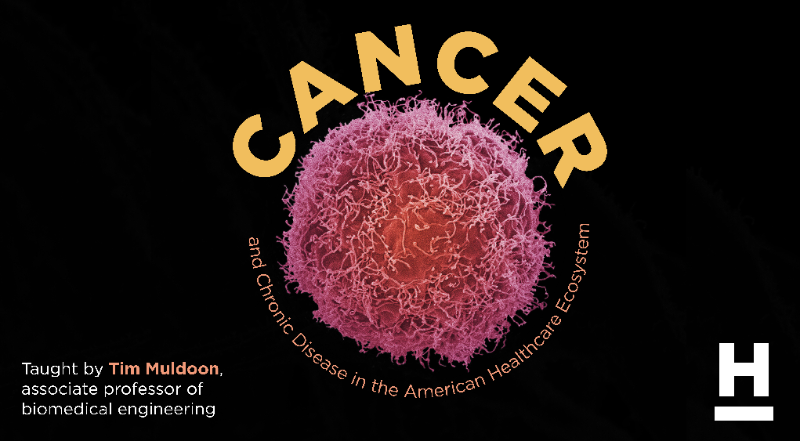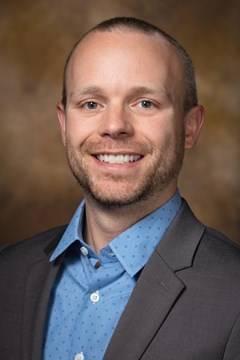Cancer and Chronic Disease in the American Healthcare Ecosystem

Cancer and Chronic Disease in the American Healthcare Ecosystem
HNRS 401H3-005
Tim Muldoon
Spring 2025
M 2 - 4:45 p.m.
GEAR 129
Course Application due Oct. 10, 2024 at 11:59 p.m.
Apply for Honors College Courses
In the United States in 2024, there will be over 2 million newly diagnosed cases of cancer, and over 600,000 will die from the disease. One out of three people will be diagnosed with some form of cancer during the course of their life. Despite an overall improving trend in cancer-related death rates over the recent decades, annual expenses for the medical care of these patients will total more than $125 billion, but even this staggering figure ignores the broader costs to society- financially as well as socially. Despite these daunting numbers, we are at the cusp of a revolution in the way we understand, diagnose, treat, and prevent cancer.
Cancer is not a single disease, but rather, a broad collection of various classifications and subtypes. Any cell type in the body may lead to its own unique form of cancer, and even two people with exactly the same type and stage of cancer, treated in exactly the same way, may not have the same outcome. Despite these challenges, we have never understood the basic biology of cancer better than we do now, and current research has lead to great strides in the way we treat- and often cure- many types of cancer.
There is significant progress to be made, scientifically as well as societally. How do we allocate resources to combat cancer? Can we better treat patients as a whole person, rather than just their disease? How can we better address healthcare disparities to improve overall outcomes? The enormous funding and attention that cancer has received also raises concerns about the “cancer / industrial complex:” are funding agencies prioritizing the right things when it comes to treating an aging population and other chronic diseases? This course will explore these broad and complex issues that cut across science, medicine, industry, and society.
Course Credit
- All students: 3 hours of honors credit
- College of Education and Health Professions
- Major-Specific honors course for health majors (Public Health, Nursing, Exercise Science, Communication Sciences & Disorders)
- Fulbright College:
- Natural Science Colloquium
- Upper-level Humanities honors seminar
- Elective or core course for MEDH minor
- Walton College:
- Honors Colloquium credit
- Note: The other three hours of required honors colloquium courses would need to come from Walton.
- Honors Colloquium credit
About Tim Muldoon
 Dr. Tim Muldoon is a founding member of the Department of Biomedical Engineering at the University
of Arkansas in Fayetteville, AR, joining the faculty as an Assistant Professor in
2012. He received his Ph.D. in Bioengineering at Rice University in Houston, TX in
2009, and was advised by Dr. Rebecca Richards-Kortum. He received an M.D. from Baylor
College of Medicine in Houston, TX in 2010. He then served as a postdoctoral research
scientist with Dr. Elizabeth Hillman at Columbia University in New York, NY, prior
to joining the University of Arkansas. He has authored 18 publications and over 35
conference papers to date. He has served as principal investigator on two National
Institutes of Health research grants, including a recently awarded Academic Research
Enhancement Award (R15) from the National Cancer Institute for his work on developing
multimodal microendoscopy and spectroscopy technologies.
Dr. Tim Muldoon is a founding member of the Department of Biomedical Engineering at the University
of Arkansas in Fayetteville, AR, joining the faculty as an Assistant Professor in
2012. He received his Ph.D. in Bioengineering at Rice University in Houston, TX in
2009, and was advised by Dr. Rebecca Richards-Kortum. He received an M.D. from Baylor
College of Medicine in Houston, TX in 2010. He then served as a postdoctoral research
scientist with Dr. Elizabeth Hillman at Columbia University in New York, NY, prior
to joining the University of Arkansas. He has authored 18 publications and over 35
conference papers to date. He has served as principal investigator on two National
Institutes of Health research grants, including a recently awarded Academic Research
Enhancement Award (R15) from the National Cancer Institute for his work on developing
multimodal microendoscopy and spectroscopy technologies.